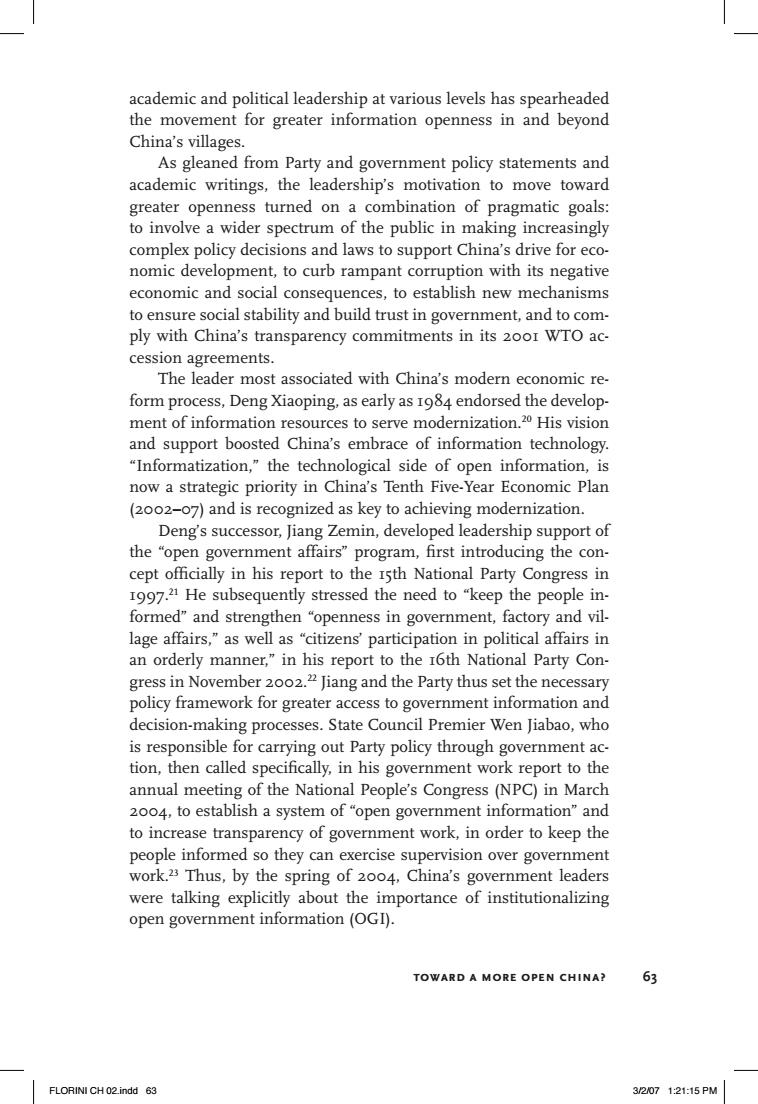正在加载图片...

academic and political leadership at various levels has spearheaded the movement for greater information openness in and beyond China's villages. As gleaned from Party and government policy statements and academic writings,the leadership's motivation to move toward greater openness turned on a combination of pragmatic goals: to involve a wider spectrum of the public in making increasingly complex policy decisions and laws to support China's drive for eco- nomic development,to curb rampant corruption with its negative economic and social consequences,to establish new mechanisms to ensure social stability and build trust in government,and to com- ply with China's transparency commitments in its zooI WTO ac- cession agreements. The leader most associated with China's modern economic re- form process,Deng Xiaoping,as early as 1984 endorsed the develop- ment of information resources to serve modernization.20 His vision and support boosted China's embrace of information technology. "Informatization,"the technological side of open information,is now a strategic priority in China's Tenth Five-Year Economic Plan (2002-07)and is recognized as key to achieving modernization. Deng's successor,Jiang Zemin,developed leadership support of the "open government affairs"program,first introducing the con- cept officially in his report to the Isth National Party Congress in 1997.21 He subsequently stressed the need to "keep the people in- formed"and strengthen "openness in government,factory and vil- lage affairs,"as well as "citizens'participation in political affairs in an orderly manner,"in his report to the 16th National Party Con- gress in November 2002.2 Jiang and the Party thus set the necessary policy framework for greater access to government information and decision-making processes.State Council Premier Wen Jiabao,who is responsible for carrying out Party policy through government ac. tion,then called specifically,in his government work report to the annual meeting of the National People's Congress (NPC)in March 2004,to establish a system of "open government information"and to increase transparency of government work,in order to keep the people informed so they can exercise supervision over government work.2 Thus,by the spring of 2004.China's government leaders were talking explicitly about the importance of institutionalizing open government information (OGI). TOWARD A MORE OPEN CHINA? 63 FLORINI CH02indd 63 3/2071:21:15PMtoward a more open china? 63 academic and political leadership at various levels has spearheaded the movement for greater information openness in and beyond China’s villages. As gleaned from Party and government policy statements and academic writings, the leadership’s motivation to move toward greater openness turned on a combination of pragmatic goals: to involve a wider spectrum of the public in making increasingly complex policy decisions and laws to support China’s drive for economic development, to curb rampant corruption with its negative economic and social consequences, to establish new mechanisms to ensure social stability and build trust in government, and to comply with China’s transparency commitments in its 2001 WTO accession agreements. The leader most associated with China’s modern economic reform process, Deng Xiaoping, as early as 1984 endorsed the development of information resources to serve modernization.20 His vision and support boosted China’s embrace of information technology. “Informatization,” the technological side of open information, is now a strategic priority in China’s Tenth Five-Year Economic Plan (2002–07) and is recognized as key to achieving modernization. Deng’s successor, Jiang Zemin, developed leadership support of the “open government affairs” program, first introducing the concept officially in his report to the 15th National Party Congress in 1997.21 He subsequently stressed the need to “keep the people informed” and strengthen “openness in government, factory and village affairs,” as well as “citizens’ participation in political affairs in an orderly manner,” in his report to the 16th National Party Congress in November 2002.22 Jiang and the Party thus set the necessary policy framework for greater access to government information and decision-making processes. State Council Premier Wen Jiabao, who is responsible for carrying out Party policy through government action, then called specifically, in his government work report to the annual meeting of the National People’s Congress (NPC) in March 2004, to establish a system of “open government information” and to increase transparency of government work, in order to keep the people informed so they can exercise supervision over government work.23 Thus, by the spring of 2004, China’s government leaders were talking explicitly about the importance of institutionalizing open government information (OGI). FLORINI CH 02.indd 63 3/2/07 1:21:15 PM